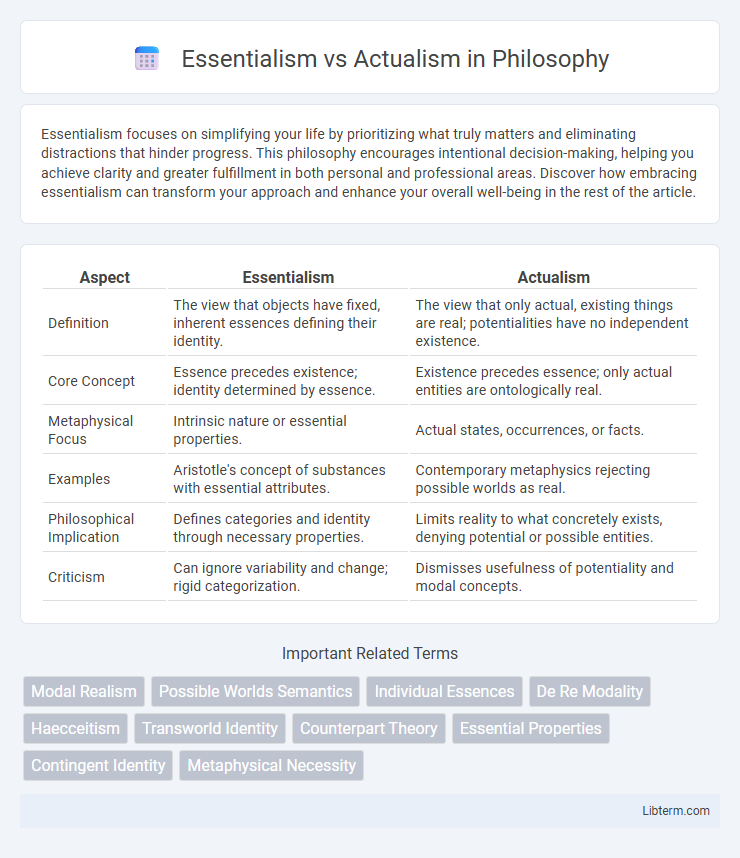Essentialism focuses on simplifying your life by prioritizing what truly matters and eliminating distractions that hinder progress. This philosophy encourages intentional decision-making, helping you achieve clarity and greater fulfillment in both personal and professional areas. Discover how embracing essentialism can transform your approach and enhance your overall well-being in the rest of the article.
Table of Comparison
| Aspect | Essentialism | Actualism |
|---|---|---|
| Definition | The view that objects have fixed, inherent essences defining their identity. | The view that only actual, existing things are real; potentialities have no independent existence. |
| Core Concept | Essence precedes existence; identity determined by essence. | Existence precedes essence; only actual entities are ontologically real. |
| Metaphysical Focus | Intrinsic nature or essential properties. | Actual states, occurrences, or facts. |
| Examples | Aristotle's concept of substances with essential attributes. | Contemporary metaphysics rejecting possible worlds as real. |
| Philosophical Implication | Defines categories and identity through necessary properties. | Limits reality to what concretely exists, denying potential or possible entities. |
| Criticism | Can ignore variability and change; rigid categorization. | Dismisses usefulness of potentiality and modal concepts. |
Understanding Essentialism: Core Concepts
Essentialism posits that entities possess inherent properties defining their true nature and identity, independent of external conditions or individual perceptions. These intrinsic attributes are necessary and unchangeable, forming the essence that determines what a thing fundamentally is. Understanding essentialism involves recognizing that essence precedes existence, shaping an entity's potential and behavior across different contexts.
Defining Actualism: Key Principles
Actualism asserts that only presently existing objects and entities are real, rejecting the existence of non-actual or purely possible beings. This philosophical view emphasizes that all truths must be grounded in what actually exists, contrasting with essentialism's focus on inherent essences or potentialities beyond observable reality. Key principles include the exclusion of non-actual entities from ontological commitment and a commitment to a strictly present and concrete reality.
Historical Background of Essentialism and Actualism
Essentialism traces its roots to ancient Greek philosophy, particularly Aristotle, who emphasized that entities possess an immutable essence defining their identity. Actualism emerged in the 20th century as a response within metaphysics, challenging essentialist notions by focusing solely on the existence of concrete particulars rather than abstract essences. The historical divergence reflects a shift from a fixed ontology of inherent properties to a more dynamic framework centered on actual entities and their relations.
Essentialism vs Actualism: Fundamental Differences
Essentialism posits that entities possess inherent, unchanging essences that define their identity and properties, while Actualism argues that only actual, concrete instances exist without relying on abstract essences. Essentialism emphasizes the necessity and universality of traits that constitute an entity's true nature, whereas Actualism focuses on the reality of existing particulars and denies the independent existence of potentialities or essences. The fundamental difference lies in Essentialism's commitment to fixed, intrinsic characteristics versus Actualism's emphasis on contingent, observable phenomena.
Philosophical Foundations Compared
Essentialism postulates that entities possess inherent essences defining their identity and guiding their existence, grounding its foundation in metaphysical realism. Actualism, conversely, emphasizes the primacy of actual states of affairs and concrete entities, rejecting potentiality as ontologically fundamental. The philosophical debate centers on whether reality is determined by immutable essences or by contingent actualities, impacting theories in ontology and epistemology.
Influence on Ethics and Morality
Essentialism posits that moral values are fixed and universal, rooted in the inherent nature of things, guiding ethical decision-making through objective standards. Actualism emphasizes the importance of real-world circumstances and outcomes, suggesting that moral judgments should depend on actions' practical consequences. The tension between these views shapes contemporary debates on whether ethics is grounded in immutable principles or adaptive to contextual realities.
Impact on Education and Learning
Essentialism in education emphasizes a core curriculum of foundational knowledge and skills, promoting discipline and mastery for effective learning outcomes. Actualism prioritizes real-world experiences and adapting to students' needs, fostering critical thinking and problem-solving abilities through practical engagement. Both philosophies shape teaching strategies, influencing curriculum design and student assessment methods in educational settings.
Essentialism and Actualism in Modern Society
Essentialism in modern society emphasizes inherent qualities and fixed traits as core to individual and group identities, influencing educational frameworks and cultural debates on gender and race. Actualism, contrastingly, prioritizes present actions and occurrences, shaping contemporary legal systems and ethical considerations by focusing on real-time circumstances rather than predetermined essence. The dynamic interplay between essentialism and actualism affects social policies, identity politics, and philosophical discourse, driving ongoing discussions about nature versus existence in human behavior.
Criticisms and Debates: A Comparative View
Essentialism faces criticism for its rigid categorization, often neglecting individual variations and evolutionary changes, which limits its applicability in dynamic contexts. Actualism, emphasizing real-time processes and events, encounters debates over its potential to discount inherent properties essential for understanding identity and causality. The comparative discourse highlights a fundamental tension between static versus dynamic ontology, prompting ongoing philosophical inquiry into the balance between inherent nature and actual occurrences.
Choosing a Perspective: Practical Implications
Choosing between Essentialism and Actualism impacts decision-making frameworks by defining whether possibilities are grounded in fixed essences or actual circumstances. Essentialism guides focus on inherent properties, benefiting fields like metaphysics and linguistics where categorical distinctions are crucial. Actualism supports dynamic perspectives, emphasizing real-world occurrences and practical adaptability in philosophy and cognitive science.
Essentialism Infographic

 libterm.com
libterm.com